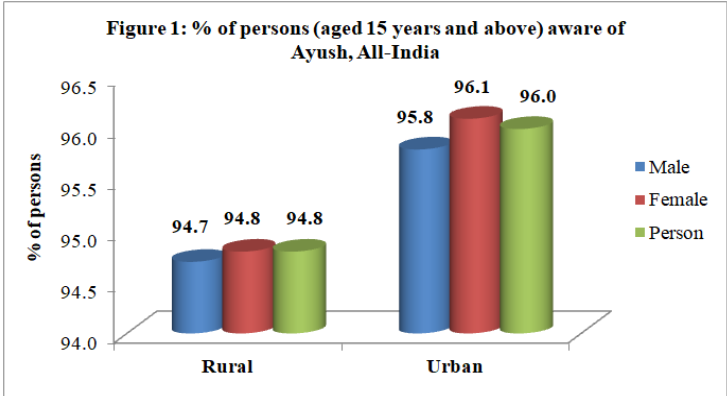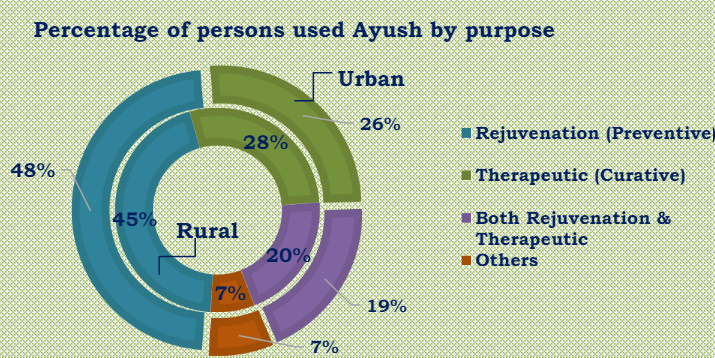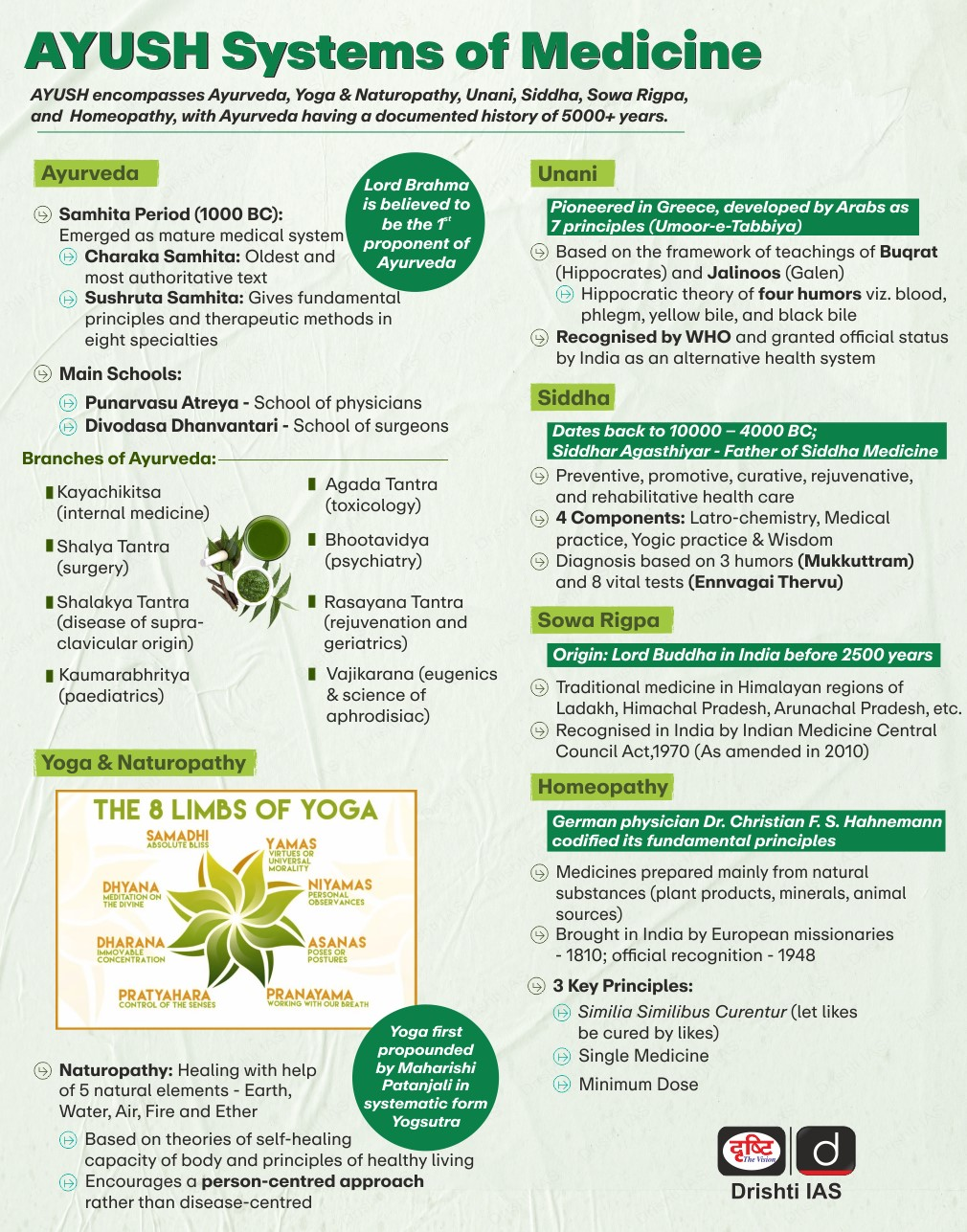Governance
First All-India Survey on AYUSH
- 18 Jun 2024
- 7 min read
For Prelims: National Survey on AYUSH, AYUSH, Ministry of Ayush, National Ayush Mission
For Mains: Initiatives Related to AYUSH, Importance of Traditional Medicine
Why in News?
Recently, the Ministry of Statistics and Programme Implementation (MoSPI) released the findings of a national survey on Ayurveda, Yoga & Naturopathy, Unani, Siddha and Homoeopathy (AYUSH) systems of medicine.
What are the Highlights of the Survey?
- About:
- This is the first-ever all-India AYUSH survey conducted by the National Sample Survey Office (NSSO) from July 2022 to June 2023, that provides valuable insights into the utilisation patterns of these traditional healthcare practices within the Indian population.
- This survey covered the entire Indian Union, excluding a few inaccessible villages in the Andaman & Nicobar Islands.
- This is the first-ever all-India AYUSH survey conducted by the National Sample Survey Office (NSSO) from July 2022 to June 2023, that provides valuable insights into the utilisation patterns of these traditional healthcare practices within the Indian population.
- Objectives: To collect information on:
- Awareness of people about the traditional system of healthcare (AYUSH system of medicine).
- Uses of AYUSH for prevention or treatment of ailments.
- Awareness of the households about home remedies, medicinal plants, local health tradition/folk medicine.
- Gathering information on household expenditure for treatments using AYUSH medicine systems.
- Key Findings:
- Awareness of AYUSH:

- In rural India, around 95% of males and females (aged 15 and above) are knowledgeable about AYUSH, while in urban areas the awareness rate is around 96%.
- About 79% of households in rural India and about 80% in urban India have at least one member aware about medicinal plants and home medicines.
- Around 24% of the households (in both rural and urban India) have at least one member aware about folk medicine or local health tradition.
- Use of AYUSH:
- Around 53% of people in urban areas and 46% in rural areas have used AYUSH for prevention or treatment of ailments, during the last 365 days.
- Expenditure Incurred for Availing Treatment of AYUSH:
- The average expenditure per person for prevention or treatment of ailments using AYUSH stood at Rs. 574/person in urban areas and Rs. 472/person in rural areas.
- Use of AYUSH System by Purpose:
- Awareness of AYUSH:
- Practice of Yoga:
- In around 1.1 crore households in rural India and around 1.4 crore in urban India, at least one member of the household is found to practice yoga regularly.
AYUSH
- AYUSH is the acronym of the medical systems that are being practised in India such as:
- Ayurveda: Ancient system emphasising holistic well-being.
- Yoga: Union of body, mind, and spirit through physical postures and meditation.
- Naturopathy: Natural healing using elements like water, air, and diet.
- Unani: Balance restoration through herbal medicines and humoral theory.
- Siddha: Traditional Tamil medicine with roots in five elements and humours.
- Homoeopathy: Highly diluted remedies stimulating self-healing responses.
- These systems are based on definite medical philosophies and represent a way of healthy living with established concepts on prevention of diseases and promotion of health.
- The Ministry of AYUSH, is responsible for developing education, research and propagation of AYUSH in India.
What are the Government Schemes Related to Promotion of AYUSH in India?
- Centrally Sponsored Schemes:
- National Ayush Mission:
- It was launched in 2014 to promote the traditional and cost-effective AYUSH system of medicine in India.
- It focuses on strengthening infrastructure development, promoting education and research, manpower augmentation, and quality control in AYUSH.
- National Ayush Mission:
- Central Sector Schemes:
- Ayur Gyan:
- The scheme aims to promote education, research, and innovation in Ayush and has been approved for the period from FY 2021-22 to FY 2025-26.
- It involves 2 components: Capacity Building and Continuing Medical Education (CME) in AYUSH to provide training and bridge knowledge gaps for AYUSH professionals and Research & Innovation in AYUSH to supports research in AYUSH systems, focusing on priority areas aligned with national health programs.
- AYURSWASTHYA:
- The AYURSWASTHYA Yojana's Centre of Excellence program grants money to organisations and institutes working in AYUSH. This funding helps them improve their facilities, research, and overall operations.
- Champion Service Sector Scheme:
- It aims to boost medical tourism in India. It goes beyond just promoting traditional medicine systems like Ayurveda and Yoga.
- The scheme also aims to attract a surge of international patients, tourists, and visitors seeking these unique healthcare options in India.
- Promotion of International Cooperation in AYUSH:
- It aims to promote and strengthen awareness and interest about AYUSH Systems of Medicine and to facilitate International promotion, development and recognition of AYUSH.
- Ayush Oushadhi Gunvatta Evam Uttpadan Samvardhan Yojana:
- It aims to upgrade AYUSH medicine quality and manufacturing in India making them safer, more trusted, and potentially exported worldwide.
- Conservation, Development, and Sustainable Management of Medicinal Plants:
- It aims at promotion, cultivation and preservation of medicinal plants.
- The National Medicinal Plant Board set up by the Ministry of AYUSH aims to support the growth and cultivation of medicinal plants and to coordinate development efforts across different ministries, departments, and organisations.
- Ayur Gyan:
Other Schemes Related to AYUSH
|
Drishti Mains Question Q. Discuss the role of AYUSH systems of medicine in promoting preventive healthcare and reducing the burden on conventional healthcare systems in India. Suggest measures to further integrate and leverage the strengths of AYUSH for a holistic healthcare approach. |
UPSC Civil Services Examination, Previous Year Question (PYQ)
Mains
Q. How is the Government of India protecting traditional knowledge of medicine from patenting by pharmaceutical companies? (2019)







-min.jpg)